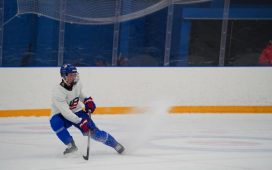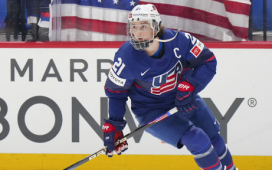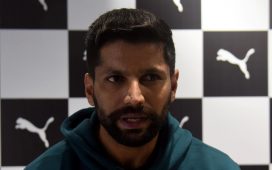At the time of his firing by the Toronto Maple Leafs, it seemed certain Mike Babcock would be back in the NHL. Incidents and allegations that have come to light recently have brought that into question. Will he be back?

This is going to seem like a massive generalization, but some of the most respectful, likeable and salt-of-the-earth people you will ever meet live in Sweden. As a rule, Swedes are generally less impressed with themselves than everyone else is. As hockey players, they are among the lowest-maintenance guys on any team. And most of all, they almost never speak ill of anyone.
So for Johan Franzen to describe Mike Babcock as, “the worst person I have ever met,” man, that’s one damning indictment. It could also be a career killer for Babcock. What Babcock allegedly did to Franzen during the 2012 playoffs was, without question, over the line. Is it enough to make Babcock so toxic in NHL circles that he’ll never patrol a bench in the best league in the world ever again? It could be. I asked some GMs in the league that exact question recently and the reaction has been mixed. There were a couple who would never hire him now and don’t think he’ll ever be worth the trouble again, but there were some who thought that with the passage of time, a reformed Mike Babcock might be able to get back into the NHL. One of them opined that he’ll likely be persona-non-grata through this summer, but that one of the league’s 32 teams might be ready to hire him in the off-season of 2021, when he would have two years left on his current deal with the Maple Leafs.
It’s probably safe to assume that Babcock will never work with a Hockey Canada team again, largely because a public entity like that would not want to deal with the baggage, the bad publicity and the backlash that would come with appointing him. But the NHL is a different thing altogether. This is a league that has given second chances to Craig MacTavish, Todd Bertuzzi and Dany Heatley. Time does indeed change perspective. “The problem is that everyone is looking for perfection,” one GM said, “and nobody’s perfect.”
To be sure, a great majority of the players who played for Mike Babcock didn’t like him at best. A good number of them hated him. Mike Commodore is the president of that particular club. Chris Chelios, who disclosed the Franzen incident despite the fact that he hadn’t played for the Red Wings in more than three years, is a card-carrying member. But you also have to remember that in the 2008 playoffs, the Red Wings were up 3-0 on the Dallas Stars in the Western Conference final before the Stars roared back to win Games 4 and 5. For Game 6 in Dallas, Babcock pulled the 36-year-old Chelios out of the lineup and replaced him with Andreas Lilja. The Red Wings went on to win Game 6 and Lilja took Chelios’ spot in the Stanley Cup final. Then a little more than six months later, Babcock dressed Chelios as the seventh defenseman and gave him just five shifts, for a total of 1:57 of ice time in the Winter Classic, which was played in Chelios’ hometown of Chicago.
There were a lot of players who hated Mike Babcock and a lot of them had reason to hate him. But if you canvassed all the players who played for him in Anaheim, Detroit and Toronto, you’d probably find a good number of them who didn’t like his methods, but would also begrudgingly admit that they needed to be pushed and because Babcock did that, they played for winning teams, made a lot of money and lived the good life in the NHL. One GM acknowledged that when Mike Babcock is your coach, “he’s in your underwear,” which means he’s overbearing as hell. If you turn left and your check turns right and gets a scoring chance, there’s a good chance you’re going to be spending time in the video room. If you don’t perform and Babcock doesn’t believe he can win with you in the lineup, you’re going to be either watching the games as a healthy scratch or you’ll be in the American League. Do people really think Babcock intentionally went out to screw Mike Modano out of playing 1,500 career games because he didn’t like him? The same with Jason Spezza, who bought hundreds of tickets for his first game in Toronto and was a healthy scratch. One hockey executive once told me that as soon as I find the coach who is more interested in screwing over players than winning games, to let him know.
Part of the issue here is that there is a push and pull between the two things the public demands. The first one is winning. If you’re a coach, you’re judged on wins and losses and your job status depends upon it. Just ask Jeff Blashill, who replaced Babcock in Detroit. You might not find a better man in the game, but he will likely be fired after this season because he coaches a team that has the biggest dearth of NHL talent in the NHL. And now, you’re rightly also expected to live up to standards of behavior that are at cross-purposes with the first expectation. Sometimes coaches cross that line. Babcock certainly did, on more than one occasion.
But does that mean he should never work in the NHL again? Probably not, particularly if he rehabilitates himself. And this doesn’t even touch on the Xs and Os aspect of coaching. There’s a good chance Babcock’s stubborn insistence on playing the game his way simply won’t win in the NHL anymore. As one GM said, “Did it ever work? I mean, he won gold medals with the Olympic team, but you or I could have coached those teams. He won one Stanley Cup. For it to be worth it, you have to win every second or third year in my eyes.”
So, it’s easy to say right now when everything is fresh that Babcock should not and will not ever coach an NHL team again. Time will tell if that’s actually the case.
Want more in-depth features, analysis and an All-Access pass to the latest content? Subscribe to The Hockey News magazine.








